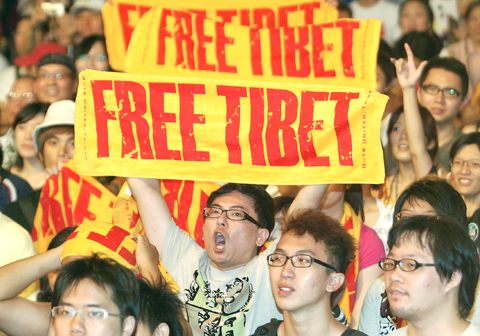Thousands of Tibet supporters gathered in Taipei yesterday for a marathon concert organized by civic groups as part of a series of activities to commemorate the 1959 uprising in Tibet. Chanting “Free Tibet” and “Long live the Dalai Lama,” the crowd waved banners and Tibetan flags.
In unison, the crowd signed the letter “T” for Tibet with their arms after watching a short video clip of a speech by Tibetan spiritual leader the Dalai Lama, who invoked a blessing on the performers and the future of Taiwan.
Hosted by Guts United, Taiwan, the Taiwan Indie Music Association and Taiwan Friends of Tibet, the “50th Spring: Free Tibet” concert featured 10 independent bands and singers who entertained the audience from the early afternoon through the late evening. Organizers estimated more than 4,000 people attended the event yesterday.

PHOTO: AP
Retired teacher Chen Hsiao-cheng (陳孝誠), 67, said the concert was important because not enough young people understand the plight of Tibetans and how Taiwan’s apathy toward Tibet could adversely affect their freedom in the long run.
A visitor from the US, Jennifer Donnell, said the public’s power and anger were palpable and that Beijing should listen to what people have to say, not just in Taiwan, but everywhere in the world, about its actions in Tibet.
Amnesty International Taiwan vice chairman Lee Ming-tsung (李明璁) said civic groups have to shoulder the responsibility of safeguarding freedom and human rights at a time when the mainstream media and the government are not doing enough.
“Freedom does not just fall from the sky, but is rather something that we need to fight for and protect, as it might slip away bit by bit if we let down our guard and take it for granted,” Lee said.
People in Taiwan should tell the government to pay more attention to human rights issues in China, Lee said.
Former premier Su Tseng-chang (蘇貞昌) also took part in the event yesterday, saying that President Ma Ying-jeou’s (馬英九) policy toward Tibet was the antithesis of public opinion and that people should voice their support for freedom in Tibet.
“Despite the Chinese Nationalist Party’s [KMT] brutal oppression of the Taiwanese people during the White Terror, Taiwan still emerged as a democratic country that values freedom and human rights. This government’s unsupportive attitude toward Tibet and the Uighurs does not at all represent the people of Taiwan,” Su said.

AGING: As of last month, people aged 65 or older accounted for 20.06 percent of the total population and the number of couples who got married fell by 18,685 from 2024 Taiwan has surpassed South Korea as the country least willing to have children, with an annual crude birthrate of 4.62 per 1,000 people, Ministry of the Interior data showed yesterday. The nation was previously ranked the second-lowest country in terms of total fertility rate, or the average number of children a woman has in her lifetime. However, South Korea’s fertility rate began to recover from 2023, with total fertility rate rising from 0.72 and estimated to reach 0.82 to 0.85 by last year, and the crude birthrate projected at 6.7 per 1,000 people. Japan’s crude birthrate was projected to fall below six,

Conflict with Taiwan could leave China with “massive economic disruption, catastrophic military losses, significant social unrest, and devastating sanctions,” a US think tank said in a report released on Monday. The German Marshall Fund released a report titled If China Attacks Taiwan: The Consequences for China of “Minor Conflict” and “Major War” Scenarios. The report details the “massive” economic, military, social and international costs to China in the event of a minor conflict or major war with Taiwan, estimating that the Chinese People’s Liberation Army (PLA) could sustain losses of more than half of its active-duty ground forces, including 100,000 troops. Understanding Chinese

US President Donald Trump in an interview with the New York Times published on Thursday said that “it’s up to” Chinese President Xi Jinping (習近平) what China does on Taiwan, but that he would be “very unhappy” with a change in the “status quo.” “He [Xi] considers it to be a part of China, and that’s up to him what he’s going to be doing, but I’ve expressed to him that I would be very unhappy if he did that, and I don’t think he’ll do that. I hope he doesn’t do that,” Trump said. Trump made the comments in the context

SELF-DEFENSE: Tokyo has accelerated its spending goal and its defense minister said the nation needs to discuss whether it should develop nuclear-powered submarines China is ramping up objections to what it sees as Japan’s desire to acquire nuclear weapons, despite Tokyo’s longstanding renunciation of such arms, deepening another fissure in the two neighbors’ increasingly tense ties. In what appears to be a concerted effort, China’s foreign and defense ministries issued statements on Thursday condemning alleged remilitarism efforts by Tokyo. The remarks came as two of the country’s top think tanks jointly issued a 29-page report framing actions by “right-wing forces” in Japan as posing a “serious threat” to world peace. While that report did not define “right-wing forces,” the Chinese Ministry of Foreign Affairs was